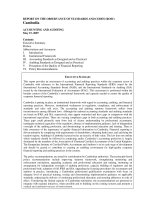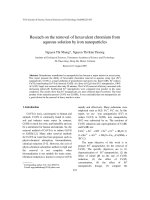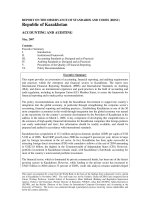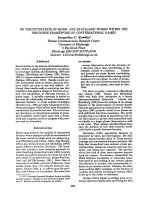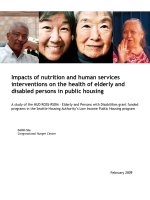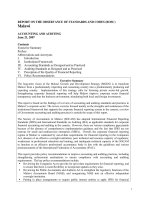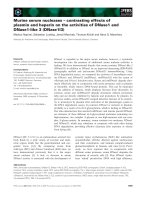Consultation on the Removal of Speaking and Listening Assessment from GCSE English and GCSE English Language ppt
Bạn đang xem bản rút gọn của tài liệu. Xem và tải ngay bản đầy đủ của tài liệu tại đây (432.64 KB, 24 trang )
Consultation on the Removal of
Speaking and Listening Assessment
from GCSE English and GCSE English
Language
April 2013
Ofqual/13/5274
Contents
Introduction 2
Background 3
The current qualifications 3
The case for change 3
About this consultation 4
Timing of the changes 5
Impact on results 5
Our proposals 7
Proposal 1: add a requirement for GCSE English and GCSE English language that
the marks for speaking and listening no longer count towards the overall grade 7
Proposal 2: re-weight the remaining components 7
Proposal 3: add a requirement for exam boards to report speaking and listening
achievement separately on the GCSE certificate 8
Proposal 4: to adopt proposals 1, 2 and 3 for first certification in summer 2014 9
Proposal 5: to use the comparable outcomes approach when awarding the first of
these revised qualifications 9
Next steps 10
Draft General Condition X 10
Consultation questions 12
How to respond to this consultation 12
Information pages: your details 13
Questions 16
About us 21
How GCSEs are regulated 21
Consultation on the Removal of Speaking and Listening Assessment from GCSE
English and GCSE English Language
Ofqual 2013 2
Introduction
This consultation is about GCSE English and GCSE English language. We want to
make changes to the way in which the speaking and listening component of the
qualification contributes to a student’s overall result, and the way in which
achievement in speaking and listening is reported.
We are proposing that performance in speaking and listening will no longer contribute
to the overall mark and grade achieved by a student. Instead, results will be
calculated from the other component parts of the qualification.
If these proposals are implemented, then from 2014 students would achieve GCSE
grades calculated without reference to their speaking and listening performance.
Speaking and listening skills would continue to be assessed as they are now, but
students’ performance in speaking and listening would be assessed and reported
separately – and would be shown as an endorsement on students’ GCSE
certificates.
For teachers, the proposed change would not require any changes to the way
speaking and listening is taught or assessed. For candidates and other users of the
qualification, this arrangement would provide more detail of individual achievement,
as individual GCSE certificates would show the GCSE grade and the results of the
speaking and listening assessment separately.
For schools, it would mean that the grade used for accountability purposes would not
include the speaking and listening component of the qualification. The reason we are
proposing this change is to make the qualifications more robust, and more resistant
to pressure from school accountability systems.
Overall results in these qualifications will fall if these changes are implemented
without any further action on our part, because students generally do better in
speaking and listening than in the rest of the qualification. The proportion of
candidates attaining grades A*–C would drop noticeably. We are proposing to use a
comparable outcomes approach to setting standards, to smooth the transition and to
ensure like-for-like results. We believe that to be the most ethical and the fairest
approach.
The changes we are now proposing are our last planned actions to strengthen these
qualifications pending their replacement with new qualifications in due course.
However, we will keep them under review and consider further actions if necessary,
to ensure fair outcomes and protect standards.
Consultation on the Removal of Speaking and Listening Assessment from GCSE
English and GCSE English Language
Ofqual 2013 3
Background
The current qualifications
GCSE English and GCSE English language were new qualifications introduced for
teaching from September 2010. Students can choose between English, which covers
the National Curriculum Programme of Study for English, and English language,
which has to be taken alongside English literature to cover the Programme of Study.
Previously, students had only one option – English, taken with or without English
literature.
The previous GCSE English qualification comprised 40 per cent coursework and 60
per cent written papers. The new English/English language qualifications have 60 per
cent controlled assessment (20 per cent speaking and listening, and 40 per cent
reading and writing) and 40 per cent written papers.
The case for change
GCSE English and English language results are extremely important to students.
They are also important to schools, as results in these subjects are central to how
schools are judged. In practice, these new qualifications have proved to be poorly
designed in a number of ways. More detail is available in our August and November
2012 reports
1
.
We thought it essential to strengthen these qualifications, because otherwise there is
a real risk that they will not result in fair outcomes. We required exam boards to
postpone grading the January 2013 units until summer 2013, and we have made the
qualifications linear (rather than modular) from summer 2014. Student achievement
in these GCSEs is assessed predominantly by controlled assessment, and to
strengthen those arrangements immediately, we tightened the moderation
tolerances
2
for November 2012 onwards.
1
www.ofqual.gov.uk/news/poor-design-gcse-english-exam-grade-variations/
2
The tolerance is the allowed variation between the teachers’ marks and the moderator’s marks for a
school. If teachers’ marking is within tolerance, their marks are not adjusted. If teachers’ marking is
outside tolerance, then the exam board is likely to adjust their marks.
Consultation on the Removal of Speaking and Listening Assessment from GCSE
English and GCSE English Language
Ofqual 2013 4
In our November 2012 report, we expressed particular concerns about the
effectiveness of the moderation of controlled assessment in the speaking and
listening component, the subject of this consultation.
Speaking and listening assessments are ephemeral. Only a third of schools are
visited by exam board moderators in any academic year. Exam boards have put in
place some additional controls to identify schools and colleges where marking of
speaking and listening appears to be out of line with performances in other units, but
this can only be done after results have been issued.
We do not believe that the current arrangements for speaking and listening can
produce fair outcomes for students overall. We have considered with exam boards
whether more enhanced moderation or other physical controls (such as recording
assessments) would ensure valid and manageable assessment of speaking and
listening, but there are no practical arrangements that we consider we can make to
ensure assessment of speaking and listening is sufficiently resilient. Therefore, we
are proposing a different approach – to remove speaking and listening from the
pressures of the accountability measures.
About this consultation
We regulate GCSE English and GCSE English language qualifications in England, so
this consultation covers England only. The Welsh Government regulates GCSE
English language in Wales (GCSE English is not available in Wales) and has already
made changes to the GCSE English language qualification being taught in Wales
from September 2012. The Northern Ireland regulator, the Council for the Curriculum,
Examinations and Assessment (CCEA), is currently reviewing the GCSEs and GCEs
offered there. The rest of this document relates to England only, though we will keep
the regulators in other parts of the UK informed about our plans.
We have carried out an equality analysis of these proposals, which is published
separately.
3
3
www.ofqual.gov.uk/files/2013-04-25-equality-analysis-speaking-and-listening-changes.pdf
Consultation on the Removal of Speaking and Listening Assessment from GCSE
English and GCSE English Language
Ofqual 2013 5
The Government has proposed new GCSEs and it is intended that new GCSEs in
English language will be taught from September 2015 onwards. But we need to
strengthen further the current qualifications before new GCSEs are introduced. Our
aims are to increase confidence in controlled assessment results and to increase
validity of GCSE English and English language results. We are proposing to remove
the speaking and listening component from the results calculations, so that:
the speaking and listening component is reported separately on the GCSE
certificate;
the overall grade is calculated using only marks from the written papers and
reading/writing controlled assessment units;
the remaining units are re-weighted so that the qualification comprises 40 per
cent reading/writing controlled assessment and 60 per cent written papers.
We do not envisage that these changes will require any material changes to what is
to be taught for the current GCSEs. In particular, these changes do not imply any
downgrading of speaking and listening skills. They remain part of the current Key
Stage 4 National Curriculum. The proposed changes reflect the difficulty of assessing
these skills securely under the current model.
We will review the responses to this consultation before making a final decision and
we will implement any changes by imposing a new General Condition on exam
boards offering these qualifications.
Timing of the changes
These changes, if implemented, do not require changes to teaching or assessment.
They change only the way the final results in each qualification are calculated. We
propose that these changes are introduced for summer 2014, when students who are
currently in the first year of a two-year course will take their assessments. We think it
important that these qualifications are made sufficiently resilient as quickly as
possible.
Impact on results
Changing the weightings of the units will have an impact on how well individual
students do relative to one another. Removing speaking and listening marks from the
overall GCSE grade will have a greater effect on those students who might have
performed better on one unit than on others. For example, students who would have
gained a particular grade because of a strong performance in speaking and listening
may achieve a lower grade. Conversely, students who would not have performed
Consultation on the Removal of Speaking and Listening Assessment from GCSE
English and GCSE English Language
Ofqual 2013 6
well in speaking and listening may achieve higher grades, given that those grades
will be based solely on the reading/writing controlled assessment and the written
papers. This is likely to mean that the overall rank order of students will be slightly
different from what it would have been. So even if the overall results look similar, it
may be that there is greater variation in individual schools’ results.
We and the exam boards have modelled the likely effect on results overall if these
changes go ahead. We estimate that removing speaking and listening from the
qualification would mean a drop of between 4 and 10 percentage points in the
proportion of students achieving grades A*–C, depending on the specification. The
effect is likely to be greatest at the C/D borderline.
For these reasons we are proposing to use a comparable outcomes approach to
setting standards in these revised GCSEs. Modelling by exam boards suggests that
this might mean grade boundaries for grades A and C on the remaining units would
have to be set 1 or 2 marks lower than would otherwise be the case, in order to
achieve comparable outcomes, year on year.
We have set out each of our proposals in more detail in the next section, and we
want to hear what you think about them. Consultation questions, and information
about how to respond, are set out at the end of the document.
Consultation on the Removal of Speaking and Listening Assessment from GCSE
English and GCSE English Language
Ofqual 2013 7
Our proposals
Proposal 1: add a requirement for GCSE English and GCSE English
language that the marks for speaking and listening no longer count
towards the overall grade
Currently the subject criteria for GCSE English and GCSE English language state
that 20 per cent of the overall assessment must require learners to demonstrate their
ability in speaking and listening. All exam boards do this by controlled assessment.
We are proposing to change those requirements so that marks for speaking and
listening no longer count towards the overall grade.
Proposal 2: re-weight the remaining components
The current subject criteria specify that 40 per cent of the assessment should be
external (set and marked by the exam board) and 60 per cent should be by controlled
assessment (set by the exam board and marked by the teacher). If the speaking and
listening marks no longer contribute to the overall grade, the weightings for the
remaining units must change.
There are several options for re-weighting the assessment. These are set out in the
table below.
Option
Weighting of
written papers
Weighting of
controlled
assessment
Comments
1
60%
40%
This option would mean scaling up the
marks for the written papers, and
leaving the marks for reading/writing
controlled assessment unchanged. It
would return the proportion of internal
assessment to the level it was with the
previous GCSE.
2
50%
50%
This option would mean scaling up the
marks for the written papers and for
the reading/writing controlled
assessment.
3
40%
60%
This option would preserve the current
weightings and would mean that the
marks for the reading/writing
controlled assessment would be
Consultation on the Removal of Speaking and Listening Assessment from GCSE
English and GCSE English Language
Ofqual 2013 8
scaled up, and marks for written
papers would be unchanged.
Our proposal is to adopt option 1 from the above options. We believe this is the most
appropriate option to achieve our aims to increase confidence in controlled
assessment results and to increase validity of GCSE English and English language
results. Written exams are more resilient to pressures on schools from accountability
measures and therefore we are proposing to adopt the highest weighting for the
written papers.
Proposal 3: add a requirement for exam boards to report speaking
and listening achievement separately on the GCSE certificate
Between 1988 and 1993, assessment of speaking and listening in English was
through a separate ‘oral communication’ element, which was assessed by teachers
on a scale of 1 to 5 (with 1 being the highest and 5 being the lowest). This oral
communication grade was reported separately on the student’s certificate. Students
had to achieve at least a grade 5 to be awarded a GCSE grade, and at least a GCSE
pass to be awarded their oral communication grade. From 1994 onwards, speaking
and listening became a part of the GCSE, with marks for speaking and listening
contributing to the overall grade.
Speaking and listening is a requirement of the National Curriculum Programme of
Study for English. This means that maintained schools in England are required to
teach the skills of speaking and listening. We are not proposing that schools change
their teaching as a result of these changes to the way the GCSE grade is calculated.
We are proposing to remove the speaking and listening marks from the overall
qualification and instead to require exam boards to report speaking and listening
achievement separately on the certificate, on a scale of 1 to 5 (with 1 being the
highest and 5 being the lowest, and ungraded below this). This is the same grading
scale that was used when oral communication was reported separately from GCSE
English grades 20 years ago.
We are not proposing to make achievement in speaking and listening a hurdle to
GCSE achievement, so we are not proposing that students should have to achieve
at least a grade 5 in speaking and listening to be awarded their GCSE grade. We
have concerns about the reliability of the marks for speaking and listening because of
the pressure on these qualifications. Making assessment of speaking and listening a
hurdle would put the assessment under even greater pressure. We also believe that
making speaking and listening a hurdle would disproportionately affect certain groups
Consultation on the Removal of Speaking and Listening Assessment from GCSE
English and GCSE English Language
Ofqual 2013 9
of students and we are particularly keen to hear views on this aspect of these
proposals.
We are not proposing to make changes to the current access arrangements, which
allow students to be given an exemption from speaking and listening as a last resort
if no other reasonable adjustments are available. Currently, where exemptions are
used this is indicated on the certificate. If we remove speaking and listening from the
overall grade and report it separately, then it would not be reported for students who
had been granted an exemption.
Proposal 4: to adopt proposals 1, 2 and 3 for first certification in
summer 2014
We believe the changes outlined in proposals 1, 2 and 3 can be put in place without
changing the written papers or the reading/writing controlled assessment tasks. We
are not proposing that exam boards change their written papers or their controlled
assessment tasks, but that they should simply scale up the marks for the written
papers. Nor are we proposing that schools alter the amount of time spent teaching
particular aspects of the curriculum.
It is therefore possible to put in place the changes for those students entering for the
qualification in summer 2014 and this is what we propose to do. This would mean
those students currently in Year 10 expecting to take their qualification at the end of a
two-year course (in summer 2014) would have this new assessment structure.
Proposal 5: to use the comparable outcomes approach when
awarding the first of these revised qualifications
Since 2009, we have adopted a comparable outcomes approach when setting grade
standards in new qualifications. This approach means that if the cohort of students
taking the qualification is similar in terms of ability, then we would expect the
outcomes – the proportions of students achieving each grade – to be similar. The aim
of this approach is to minimise any advantage or disadvantage for students who are
the first to sit a new qualification, given the difficulty of maintaining standards through
a period of change.
In summer 2014, GCSEs in England, including English and English language, will
become linear, so students must take all the assessment at the end of the course.
Removing speaking and listening marks from the overall qualification would be a
further change to these qualifications.
Consultation on the Removal of Speaking and Listening Assessment from GCSE
English and GCSE English Language
Ofqual 2013 10
We are proposing to use the comparable outcomes approach for GCSE English and
English language in the first awards of these revised qualifications without speaking
and listening.
Next steps
We will take a decision on basis of the responses to this consultation. If we decide to
make the changes as set out in this document we will implement these through a
new General Condition. We are aiming to publish details of our decision before the
end of July 2013, so that schools and colleges can prepare for the new academic
year. This will also allow time for exam boards to make the necessary changes to
their qualifications.
For the purposes of this consultation, the following draft General Condition is based
on our preferred option from the proposals set out above. This draft General
Condition will be reviewed depending on feedback received.
Draft General Condition X
X.1 For the purposes of assessment of GCSE qualifications in English and/or English
language for award of qualifications in 2014, 2015 and 2016, paragraphs 11 and 12
of the GCSE Subject Criteria for English (‘English Criteria’) and paragraphs 13 and
14 of the GCSE Subject Criteria for English language (‘English language Criteria’)
shall be revised as follows:
X1.1 Paragraph 11 of the English Criteria and paragraph 13 of the English
language Criteria are revised to make the weighting for the speaking and
listening assessment objective 0 per cent and the weighting for the remaining
assessment objectives shall be adjusted in line with changes to the weighting of
internal and external assessments.
X1.2 Paragraph 12 of the English Criteria and paragraph 14 of the of the
English language Criteria are revoked and replaced with:
“GCSE specifications in [English language/English] must allocate a weighting of
60 per cent to external assessment and a weighting of 40 per cent to controlled
assessment in the overall scheme of assessment.”
X.2 An awarding organisation must not include marks for speaking and listening
when determining a Learner’s grade in GCSE English or English language.
Consultation on the Removal of Speaking and Listening Assessment from GCSE
English and GCSE English Language
Ofqual 2013 11
X.3 An awarding organisation must report speaking and listening achievement
separately on the GCSE certificate for English/English language in line with Ofqual’s
published requirements [to be developed in line with proposal 3].
Consultation on the Removal of Speaking and Listening Assessment from GCSE
English and GCSE English Language
Ofqual 2013 12
Consultation questions
This consultation is about proposed changes to GCSE English and English language
for use in England.
We would like to hear what you think about our proposals so that we can put in place
the appropriate changes to these qualifications.
We will publish the evaluation of responses to the consultation in summer 2013. In
order for us to evaluate responses properly, we need to understand who is
responding and in what capacity, so we are asking all respondents to complete our
information page.
The evaluation will only consider those responses where the information page has
been completed.
Please note that if you do not want any part of your response to this consultation to
be published you must state clearly that your response is confidential.
The deadline for responses to this consultation is Friday 7th June 2013.
How to respond to this consultation
Please respond to the consultation questions using one of these methods.
Complete the online response form at />and-listening/respond/ .
Email your response to – please include the
consultation title in the subject line of the email.
Post your response to GCSE English consultation, Ofqual, Spring Place,
Coventry Business Park, Herald Avenue, Coventry, CV5 6UB.
Consultation on the Removal of Speaking and Listening Assessment from GCSE
English and GCSE English Language
Ofqual 2013 13
Information pages: your details
Your name* ________________________________________________________
Your organisation’s name* ___________________________________________
Organisation*
( ) Awarding organisation for 14 to 19 general qualifications
( ) Awarding organisation for 14 to 19 vocational qualifications
( ) Awarding organisation for vocational and/or professional qualifications
( ) Awarding organisation for other kinds of qualifications
( ) School/college
( ) Private training provider
( ) Higher education institute
( ) Student
( ) Parent/carer
( ) Employer
( ) Other representative group/interest group
( ) Government body/organisation (national and local)
( ) Other (including general public)
School/college type
( ) Academy and/or free school
( ) Comprehensive
( ) State selective
( ) Independent
( ) Special school
Consultation on the Removal of Speaking and Listening Assessment from GCSE
English and GCSE English Language
Ofqual 2013 14
( ) Further education
( ) Sixth form
( ) None of the above (please state what) __________________________________
How many staff does your organisation employ (full or part time)?
( ) Fewer than 50
( ) 50 to 249
( ) 250 or more
Representative group/interest group type
( ) Group of awarding organisations
( ) Union
( ) Sector skills council
( ) Employer/business representative group
( ) Equality group
( ) Other voluntary or community group
( ) None of the above
Representative group/interest group name**
____________________________________________
Nation*
( ) England
( ) Wales
( ) Scotland
( ) Northern Ireland
( ) Other EU country (please state which) _______________________
Consultation on the Removal of Speaking and Listening Assessment from GCSE
English and GCSE English Language
Ofqual 2013 15
( ) Non-EU country (please state which) ________________________
Email address* ________________________________________________
How did you find out about this consultation?
( ) Our newsletters or other communications
( ) Via internet search
( ) From our website
( ) Via another organisation (please state which) ___________________
( ) Other (please state how) ___________________________________
May we contact you for more information?
( ) Yes ( ) No
Would you like us to treat your response as confidential?
( ) Yes ( ) No
We want to write clearly, directly and put the reader first. Overall, do you think
we have got this right in this document?
( ) Yes
( ) No
Do you have any comments or suggestions about the style of writing?
___________________________________________________________________
__________________________________________________________________
___________________________________________________________________
___________________________________________________________________
*Denotes mandatory fields
**Please state name of group, if you are responding from a representative group
Consultation on the Removal of Speaking and Listening Assessment from GCSE
English and GCSE English Language
Ofqual 2013 16
Questions
Proposal 1
1. To what extent do you agree that we should remove the requirement for
speaking and listening marks to contribute to the overall GCSE English/English
language grade?
( ) Strongly agree
( ) Agree
( ) Disagree
( ) Strongly disagree
( ) Don’t know/no opinion
Any comments or suggestions?
___________________________________________________________________
___________________________________________________________________
___________________________________________________________________
___________________________________________________________________
Proposal 2
2. To what extent do you agree that we should re-weight the assessment so that
the weighting for the written paper(s) is 60 per cent and the weighting for the
controlled assessment is 40 per cent (option 1)?
( ) Strongly agree
( ) Agree
( ) Disagree
( ) Strongly disagree
( ) Don’t know/no opinion
Consultation on the Removal of Speaking and Listening Assessment from GCSE
English and GCSE English Language
Ofqual 2013 17
Any comments or suggestions?
___________________________________________________________________
___________________________________________________________________
___________________________________________________________________
___________________________________________________________________
Proposal 3
3. To what extent do you agree that we should require exam boards to report
achievement in speaking and listening separately on the certificate?
( ) Strongly agree
( ) Agree
( ) Disagree
( ) Strongly disagree
( ) Don’t know/no opinion
Any comments or suggestions?
___________________________________________________________________
___________________________________________________________________
___________________________________________________________________
___________________________________________________________________
4. To what extent do you agree that students should not be required to achieve at
least a 5 in speaking and listening to be awarded a GCSE?
( ) Strongly agree
( ) Agree
( ) Disagree
( ) Strongly disagree
( ) Don’t know/no opinion
Consultation on the Removal of Speaking and Listening Assessment from GCSE
English and GCSE English Language
Ofqual 2013 18
Any comments or suggestions?
___________________________________________________________________
___________________________________________________________________
___________________________________________________________________
___________________________________________________________________
Proposal 4
5. To what extent do you agree that we should put in place these changes for
summer 2014 awards?
( ) Strongly agree
( ) Agree
( ) Disagree
( ) Strongly disagree
( ) Don’t know/no opinion
Any comments or suggestions?
___________________________________________________________________
___________________________________________________________________
___________________________________________________________________
___________________________________________________________________
Proposal 5
6. To what extent do you agree that we should use a comparable outcomes
approach to the first awards of these revised qualifications?
( ) Strongly agree
( ) Agree
( ) Disagree
( ) Strongly disagree
( ) Don’t know/no opinion
Consultation on the Removal of Speaking and Listening Assessment from GCSE
English and GCSE English Language
Ofqual 2013 19
Any comments or suggestions?
___________________________________________________________________
___________________________________________________________________
___________________________________________________________________
___________________________________________________________________
7. Do you have any comments you would like to make about the proposed
wording of the draft General Condition?
___________________________________________________________________
___________________________________________________________________
___________________________________________________________________
___________________________________________________________________
___________________________________________________________________
___________________________________________________________________
___________________________________________________________________
___________________________________________________________________
___________________________________________________________________
___________________________________________________________________
___________________________________________________________________
___________________________________________________________________
___________________________________________________________________
___________________________________________________________________
___________________________________________________________________
___________________________________________________________________
___________________________________________________________________
___________________________________________________________________
___________________________________________________________________
___________________________________________________________________
___________________________________________________________________
___________________________________________________________________
___________________________________________________________________
___________________________________________________________________
Consultation on the Removal of Speaking and Listening Assessment from GCSE
English and GCSE English Language
Ofqual 2013 20
8. Do you have any other comments you would like to make about any other
aspects of these proposals?
___________________________________________________________________
___________________________________________________________________
___________________________________________________________________
___________________________________________________________________
___________________________________________________________________
___________________________________________________________________
___________________________________________________________________
___________________________________________________________________
___________________________________________________________________
___________________________________________________________________
___________________________________________________________________
___________________________________________________________________
___________________________________________________________________
___________________________________________________________________
___________________________________________________________________
___________________________________________________________________
___________________________________________________________________
___________________________________________________________________
___________________________________________________________________
___________________________________________________________________
___________________________________________________________________
___________________________________________________________________
___________________________________________________________________
___________________________________________________________________
___________________________________________________________________
___________________________________________________________________
Consultation on the Removal of Speaking and Listening Assessment from GCSE
English and GCSE English Language
Ofqual 2013 21
About us
We regulate all academic and vocational qualifications in England, together with
vocational qualifications in Northern Ireland, where those qualifications are provided
by a body that is recognised by us to provide them.
We are a statutory body, created by the Apprenticeships, Skills, Children and
Learning Act 2009, as amended by the Education Act 2011. These Acts set out the
legal framework within which we operate, they give us certain duties and powers to
take specific forms of regulatory action, and they define the objectives that we must
seek to achieve when we exercise those powers.
We regulate to secure standards of, and public confidence in, regulated
qualifications. We also regulate to secure efficiency in the provision of regulated
qualifications and to raise awareness of the range and benefits of regulated
qualifications.
How GCSEs are regulated
All regulated qualifications must meet our General Conditions of Recognition
4
. These
demand some overarching requirements of qualifications and awarding organisations
(exam boards) that offer them. For instance, qualifications must be fit for purpose and
manageable, and exam boards must have in place clear and effective moderation
arrangements.
As well as meeting the General Conditions of Recognition, GCSEs in English and
English language must also meet the requirements of the GCSE Qualification
Criteria
5
, the GCSE Subject Criteria for English
6
and the GCSE Subject Criteria for
English Language
7
, and the relevant sections of the GCSE Controlled Assessment
Regulations
8
. These regulations were put in place in 2007 and 2008 by the
4
www.ofqual.gov.uk/files/2012-11-20-general-conditions-of-recognition-november-2012.pdf
5
www.ofqual.gov.uk/files/2012-01-13-criteria-for-gcse-qualifications.pdf
6
www.ofqual.gov.uk/files/11-10-19-gcse-subject-criteria-english.pdf
7
www.ofqual.gov.uk/files/11-10-19-gcse-subject-criteria-english-language.pdf
8
www.ofqual.gov.uk/files/11-10-06-gcse-controlled-assessments-regulations.pdf
Consultation on the Removal of Speaking and Listening Assessment from GCSE
English and GCSE English Language
Ofqual 2013 22
Qualifications and Curriculum Authority (QCA), our predecessor body. They reflect
the joint regulatory and development roles that QCA had.
We wish to make our publications widely accessible. Please contact us if you have
any specific accessibility requirements.
First published by the Office of Qualifications and Examinations Regulation in 2013
© Crown copyright 2013
You may re-use this publication (not including logos) free of charge in any format or
medium, under the terms of the Open Government Licence. To view this licence, visit
The National Archives; or write to the Information Policy Team, The National
Archives, Kew, Richmond, Surrey, TW9 4DU; or email:
This publication is also available on our website at www.ofqual.gov.uk
Any enquiries regarding this publication should be sent to us at:
Office of Qualifications and Examinations Regulation
Spring Place 2nd Floor
Coventry Business Park Glendinning House
Herald Avenue 6 Murray Street
Coventry CV5 6UB Belfast BT1 6DN
Telephone 0300 303 3344
Textphone 0300 303 3345
Helpline 0300 303 3346

